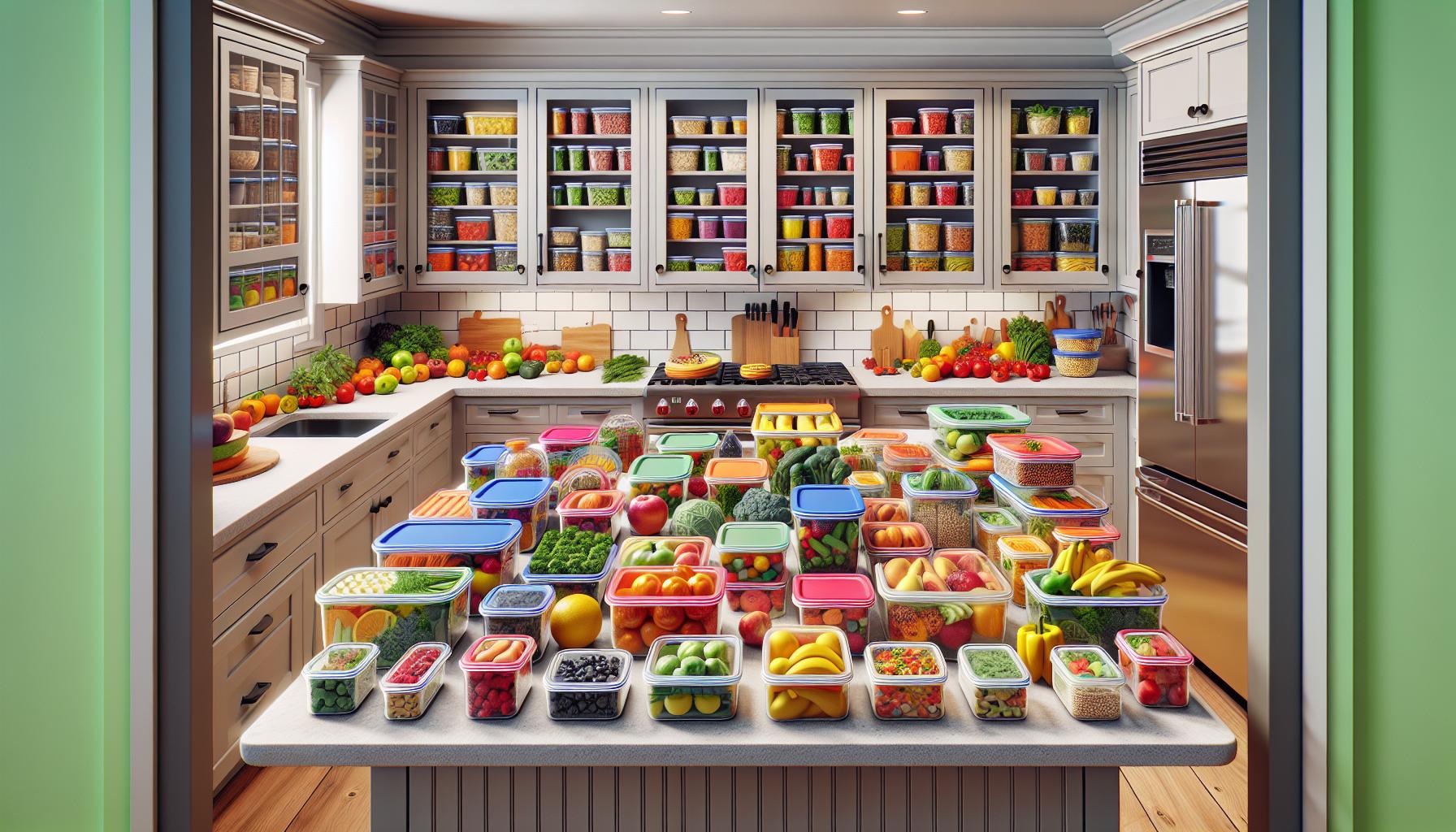Key Takeaways
- Understand Meal Prep: Meal prep involves planning and preparing meals in advance, making healthy eating easier and more efficient.
- Time-Saving Strategy: This practice reduces daily cooking time, allowing individuals to focus on other aspects of their busy lives.
- Healthier Choices: Having prepared meals on hand encourages healthier food selections and minimizes reliance on convenience foods.
- Cost-Effective: Meal prepping can save money by buying ingredients in bulk and reducing food waste through careful planning.
- Enhanced Variety: By planning meals, individuals can diversify their diets, preventing monotony and encouraging exploration of new foods.
- Stay Motivated: Setting realistic goals and overcoming challenges helps maintain motivation and consistency in meal prepping practices.
In today’s fast-paced world, maintaining a healthy lifestyle can feel overwhelming. Meal prep offers a simple yet effective solution to this challenge, allowing individuals to take control of their nutrition and save time during the week. By planning and preparing meals in advance, anyone can enjoy delicious, wholesome food without the stress of last-minute cooking.
This guide breaks down easy steps for successful meal prep, making it accessible for everyone, regardless of cooking experience. From selecting the right ingredients to organizing meals for the week, these practical tips empower readers to embrace a healthier lifestyle. With just a little effort, meal prep can transform the way they eat and help them stay on track with their wellness goals.
Meal Prep: Easy Steps For Healthy Lifestyle | Your Wellness Blog – Inspiring Healthy Living
Meal prep involves planning and preparing meals in advance, simplifying the journey toward a healthier lifestyle. This practice equips individuals with the tools needed for better nutrition.
What Is Meal Prep?
Meal prep refers to the process of preparing and portioning meals ahead of time. This can include cooking complete meals, chopping vegetables, or even assembling ingredients for easy cooking. Often done weekly or bi-weekly, meal prep enhances convenience and ensures healthier options are readily available.
- Saves Time: Meal prep streamlines weekly cooking, reducing daily time spent in the kitchen.
- Controls Portions: Pre-portioned meals help manage portion sizes, supporting weight management efforts.
- Reduces Food Waste: Planning meals minimizes excess food purchases, leading to lower waste.
- Encourages Healthy Eating: Having healthy meals on hand fosters better food choices, reducing reliance on fast food.
- Saves Money: Buying ingredients in bulk and meal prepping often costs less than frequent takeout meals.
- Promotes Variety: Planning meals allows for diverse ingredients and recipes, preventing monotony in diet.
Easy Steps for Effective Meal Prep

Effective meal prep involves simple, systematic steps that lead to healthier eating habits. By following a structured approach, anyone can streamline their cooking process and make nutritious meals easily accessible.
Planning Your Meals
Planning meals begins with selecting a variety of nutritious ingredients. Choose proteins, whole grains, and seasonal vegetables. Create a menu for the week, ensuring balanced meals with adequate portions. Include breakfast, lunch, dinner, and snacks. Utilize online resources or meal planning apps for inspiration. Write a shopping list based on the planned meals to stay organized and avoid impulse buys.
Grocery Shopping Tips
Grocery shopping focuses on efficiency and smart choices. Shop the perimeter of the store where fresh produce, dairy, and meats are located. Examine labels to avoid foods high in added sugars and preservatives. Opt for seasonal produce to ensure freshness and affordability. Buy in bulk for staples like grains and legumes, saving both time and money. Employ reusable bags to minimize waste and encourage eco-friendly practices.
Cooking and Storing Food
Cooking and storing food requires organization and proper techniques. Batch cooking saves time; prepare multiple servings of each meal for the week. Use appropriate containers that are microwave and dishwasher safe for easy reheating and cleaning. Label each container with the meal type and date for clarity. Store meals in the refrigerator for up to four days or freeze for longer preservation. Reheating meals in the oven or stovetop helps retain flavor and texture compared to microwaving.
Meal Prep Ideas and Recipes

Meal prep offers a variety of ideas and recipes that support a healthy lifestyle. These meal options ensure convenience and nutrition throughout the week.
Breakfast Meal Prep
- Overnight oats: Combine rolled oats, chia seeds, and milk or yogurt in jars. Add fruits and nuts for flavor.
- Egg muffins: Whisk eggs with spinach, bell peppers, and cheese, then bake in a muffin tin for portable breakfasts.
- Smoothie packs: Pre-portion fruits, greens, and yogurt in bags. Just blend with liquid in the morning for a quick meal.
Lunch and Dinner Options
- Quinoa bowls: Prepare quinoa as a base, then add roasted vegetables, beans, and a protein like chicken or tofu for a filling meal.
- Stir-fry: Cook a mix of vegetables and proteins in a large skillet. Store in containers with brown rice or whole-grain noodles.
- Sheet pan meals: Roast a variety of proteins and vegetables together on a single sheet pan for easy cleanup and balanced meals.
- Hummus and veggies: Prepare individual servings of hummus with pre-cut carrots, cucumbers, and bell peppers for refreshing snacks.
- Energy bites: Combine oats, nut butter, and honey with mix-ins like chocolate chips or seeds. Roll into bite-sized balls for on-the-go nutrition.
- Greek yogurt parfaits: Layer Greek yogurt with granola and berries in jars for a satisfying snack that’s easy to grab.
Tips for Staying Motivated

Staying motivated during meal prep is crucial for maintaining a healthy lifestyle. Implementing effective strategies helps individuals overcome obstacles and stay on track.
Setting Realistic Goals
Setting achievable goals ensures long-term success. Focus on specific, measurable objectives, like prepping meals for three to four days at a time. Start with small changes, such as incorporating one new healthy recipe each week or dedicating one day for meal prep activities. Celebrating accomplishments, no matter how minor, reinforces positive habits and boosts motivation for future meal prep.
Overcoming Common Challenges
Overcoming challenges enhances meal prep consistency. Address common issues like time constraints by scheduling meal prep sessions during less busy periods, like weekends or days off. Utilize easy-to-prepare recipes to reduce time spent in the kitchen. Anticipate potential obstacles, such as ingredient availability, by creating flexible menus and ensuring freezer-friendly options. Seeking support from friends or joining meal prep groups fosters accountability and encourages shared experiences, making the process more enjoyable.
Embracing Meal Prep
Embracing meal prep can transform the way individuals approach their health and nutrition. By dedicating a little time to planning and preparing meals, they can enjoy the benefits of healthier eating without the stress of last-minute decisions.
With practical tips and easy steps, meal prep becomes an achievable goal for anyone. It not only saves time and money but also encourages a more mindful relationship with food.
As they incorporate meal prep into their routine, individuals will likely find it easier to stay on track with their wellness goals and enjoy a variety of nutritious meals throughout the week. The journey to a healthier lifestyle is just a meal prep away.